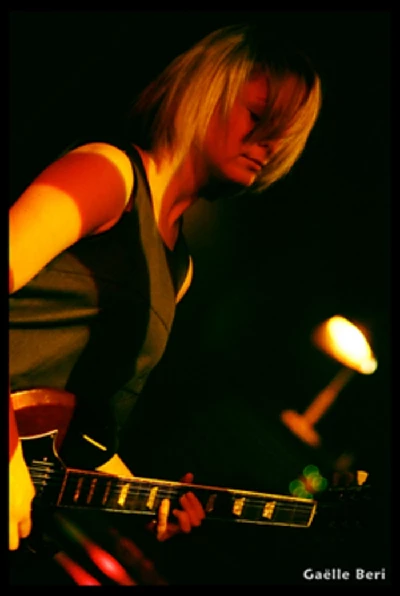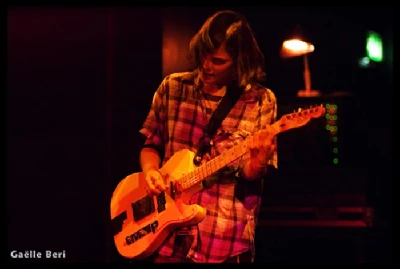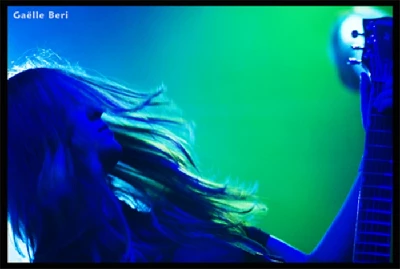Goblin Market
-
Luminaire, London, 24/5/2006
published: 22 /
6 /
2006

At the Luminaire in London, Dominic Simpson sees experimental art rockers Electrelane put on a strong show, but nevertheless be outshone by an enthralling performance from support act the Early Years
Article
One song in and it’s clear that the Early Years are very special indeed: utilising Neu!’s pounding motorik rhythm, Spacemen 3’s dissonance, and My Bloody Valentine’s droning guitars, and armed with a phalanx of effects pedals, this bass-less trio create a thrilling set of peaks and troughs, their songs enhanced by driving drums and oscillating waves of e-bowed guitar.
Swirling fireworks of guitar noise spew out as they draw forth a spider’s web of emanating sound akin to Spiritualized’s ‘Pure Phase’ but with the rhythm cranked up. It’s a heavenly, enraptured sound, and the band leave an audience enthralled, heads nodding in approval, the applause rapt as the Luminaire fills up, full of young hipsters and left-field mavericks here in this intimate West London venue. With its plush seats and walls bathed in blue lights, this makes for a classy, intimate space.
After such a breathtaking tour-de-force and a stellar tour-de-force Electrelane never quite hit the same highs , but the Brighton four-piece (now spread around Europe) are hugely experienced, having explored spacerock, Krautrock grooves, droning textures and all kinds of musical tropes for nearly ten years now. Their first album, 'Rock It To The Moon', occupied similar territory to early Stereolab, Yo La Tengo and Broadcast, with their use of hypnotic organ, droning guitar, and cavernous, echoing, driving drums.
After a subdued opener, they hit the fuzz pedal with a punked-up version of Leonard Cohen’s ‘The Partisan’, minus the French verses. Cohen’s tale of a narrator – a resistance fighter, tasting freedom on the borderlands during wartime (“When they poured across the border, I was cautioned to surrender / This I could not do / I took my gun and vanished”) is transposed with a gender twist when singer Verity Susman recites Cohen’s lyrics: “I have changed my name so often / I have lost my wife and children…”
The bulk of their set is taken from their recent album 'Axes', recorded with Steve Albini at Electrical Audio Studios, and a more organic, ‘live’ sound than the hypnotic organs and evocative film soundtracks of the first album. Not that there’s no keyboards here too, but they’re anything but hypnotic; instead, on ‘Bells’, the focal point of 'Axes', Susman frequently plays them with plonking elbows-only aplomb, while summing forth some particularly beautiful lyrics reflecting on the passing of time and of accompanying doubt: “Winter Bells in dark and silent dreams / Help me while these thoughts are troubling me…I slept through the falling of the leaves / I never thought that time could get so far / Away from me”. The rest of the band lock into a groove that starts mid-pace and then speeds up to a frenetic, pounding, mesmerising whole – a trademark sound used not only on their latest album but also on earlier songs such as ‘I Only Always Think’.
On “Eight Steps” the band incorporate a circular Victorian harmonium tango motif that could be either from Paris or Prague – possibly influenced from guitarist Mia Clarke’s stay in the Czech capital. It’s only one of many influences that the band incorporate, which also include the screeching free jazz of ‘Gone Darker’. Meanwhile, driven by a robotic disco backbeat, old favourite ‘I Want To Be The President’, is a viscous satire on warmongers and the machismo of those in command, eerily prescient at a time of war in Iraq and fear of North Korean missiles: “My gun is bigger than yours…my weapon makes me feel strong”, a viscous swipe on the phallocentrism and arrogance of world leaders’ policy.
Susman’s voice is one of the highlights of the evening, particularly missed when the band play 'Axes' most ‘difficult’ track, ‘Business Or Otherwise’, a nearly six minute long stop-and-start swath of buzzing, sawing, detuned guitar and occasional intrusion by drums, most likely intended to signify the bands experimental intention and interest in modern composers such as Cage and Stockhausen, as well as methods such as musique concréte. It’s overdone, however, and seems too self-conscious and dirge-like to really appreciate. Clarke does make up for it by draping the guitar over the amp to produce some spellbinding sounds, however, and it’s a relief when the band return to the 'Axes' opening segue with ‘Two For Joy’, the climax to the pounding groove of ‘Bells’. It’s the best moment of the set, and the closest moment to matching the enthralling grace of the support act.
Picture Gallery:-

